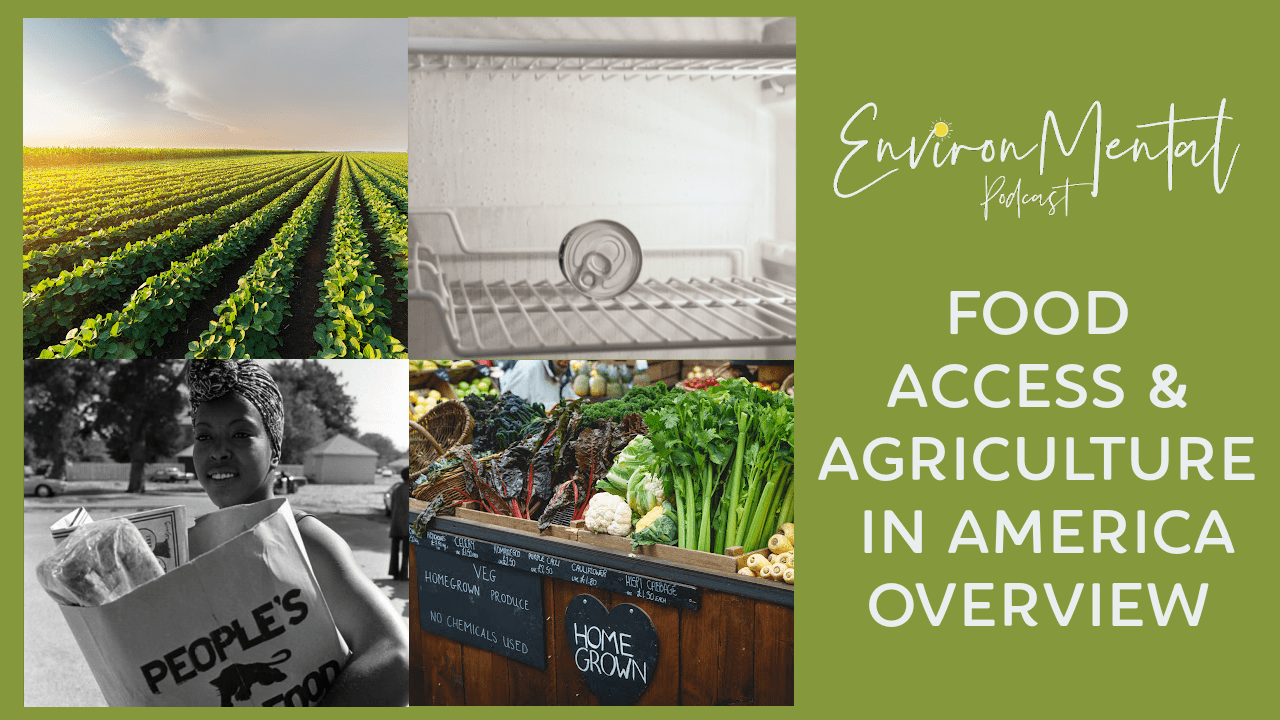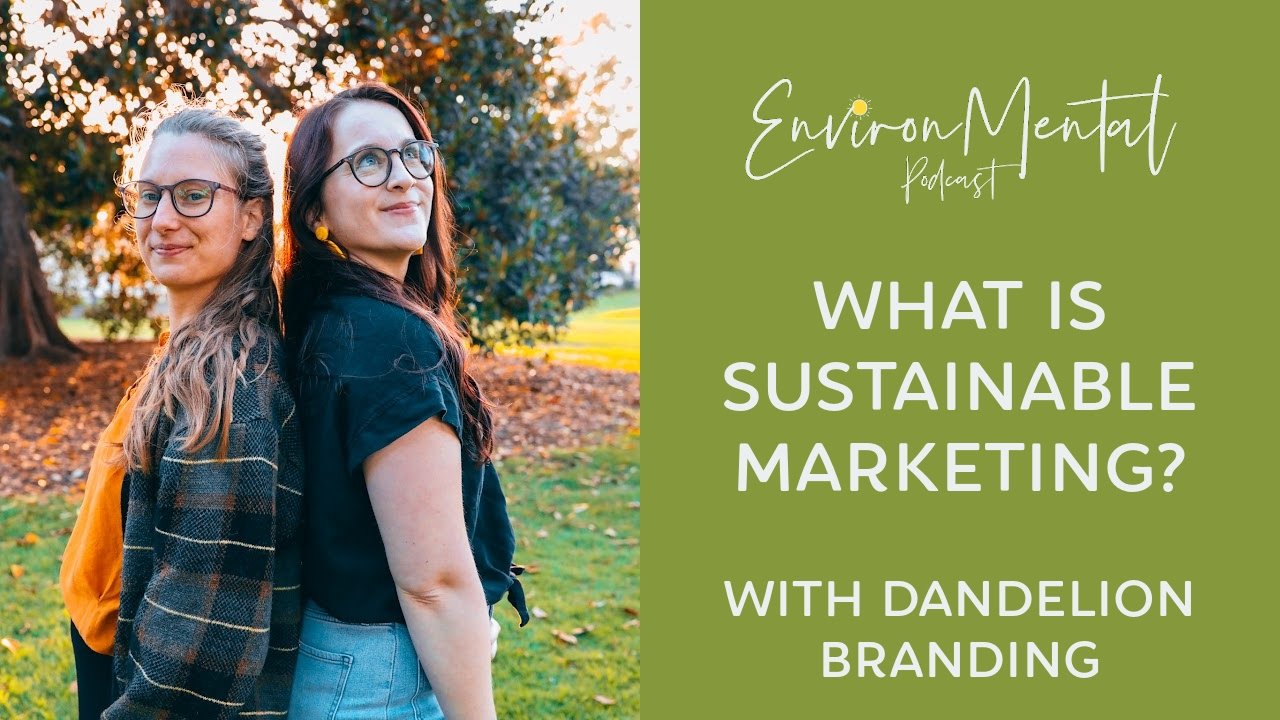One of our main goals is to better understand global sustainability efforts. We want to see sustainability from all angles so that we can offer real solutions to brands, individuals, and the industry as a whole.
That’s why we created EnvironMental Podcast with Dandelion. EnvironMental give us the opportunity to investigate different aspects of sustainability. We get to choose a topic and have a conversation about it each week, diving deeper and deeper as we go. When we feel ready to move on, I write up our investigative article to share what we learned.
For the past two months, we have been talking about food and agriculture in the US. I linked each of our podcasts at the end of the article for you to check out.
The Truth about the Food and Agriculture Industry in US
The issues around the food and agriculture industry in US are extremely multifaceted and they show up in myriad ways. From the loss of fertility in our soil to desertification to food insecurity and the intentional creation of food deserts.
Food has been losing nutritional value since the 50s
This is a real issue, folks. Not only are we farming for juiciness and beauty rather than nutrition for our food, we’re also dumping chemicals on our crops to maximize yields in the short term.
Over the past 100 years, we have turned what used to be a community-based love affair between food and culture into something akin to an assembly line. We plant in rows, dump artificial nutrients onto our plants, and then use more artificial chemicals to kill the stuff that our crops are sensitive to.
Tap roots don’t reach as deeply as they used to because we baby our crops and kill cover crops – even though the soil needs those roots to help pull nutrients from deeper within the Earth to add healthy nutrients to the top soil for future generations of plants to thrive. Adding to that, monocropping means that one type plant consistently takes the same nutrients from the soil without a way to replenish.
It’s ruining our soil, the natural fertility of our green mamma Earth is at serious risk right now. It won’t be long before we burn out the ground and when the soil isn’t naturally healthy, our food isn’t as healthy either.
What’s even more devastating is that this soil degradation is done with the intention of having the highest yield and making the most food. But it’s simply not a viable solution for the long run.
Food production accounts for over a quarter of global greenhouse gas emissions
The growth, creation, harvest, and transportation of food amounts to a huge release of greenhouse gas emissions. Our agriculture system is intimately linked to deforestation, which is a double whammy to the food industry’s carbon footprint – it removes our carbon sinks to make way for farms that add tons and tons of carbon in the air.
Then, rather than eating local, we use gallons upon gallons of fossil fuels to transport those crops all over the world. In plastic packaging that rarely gets recycled. To a grocery store that might not sell it because of an arbitrary beauty standard, but won’t give it away to the hungry folks that live in their community.
So, after all that, massive amounts of usable food ends up in a landfill.
We are wasting 30+% of all the food we grow on a regular basis.
When our food ends up in a landfill, rather than breaking down as compost, it breaks down slowly and releases methane – which is another greenhouse gas that is much more potent than carbon at trapping gas in the atmosphere.
This is what happens to almost 30% of all the food we grow.
Some of this waste isn’t avoidable, sure. Sometimes the weather leaves a crop inedible (especially in a rapid climate change situation) or there is food that is unsafe to eat and needs to be disposed of.
But way too often it’s a matter of waste from our own fridges – we throw out a lot of food (come on, you’ve shopped hungry and couldn’t eat it all). Or a farmer needed to grow extra crops to keep up with a demand that was filled by an international supplier in the end.
Or, and this is especially potent right now – post COVID – there was a labor shortage and there was no one to pick the crops or work in food production facilities.
Farm labor is still exploitative in the agriculture industry
The USDA estimates that around 73% of all the farm labor in the US is from immigrant and migrant workers. And that 50% of the total farm labor force are undocumented.
ICYMI; people in the US government are working really hard to stop undocumented immigration.
Undocumented workers have almost no bargaining power and limited job options so they are paid much less than a documented work force.
While this keeps food production costs low and our food cheap, it also means that this group of people don’t make a living wage. They get stuck in an undocumented cycle, unable to get out.
We are relying on a stigmatized population, stuck between a political climate that is railing against them while the US population is asking for (and expecting) them to act as a stable workforce.
In fact, our food system is pretty darn racist overall
This shouldn’t come as a surprise to you, but the racism in the food industry is profoundly transparent – and shameful.
Hispanic and African American families were twice as likely to experience food insecurity during the pandemic, and they are more likely to live in food deserts than their white counterparts.
Food and Power
And the reality is, this sort of inequality is intentional. Food is intimately tied to power – and in the US, the old money powerful folks are generationally wealthy plantation owners. Think about that for a moment. The food and agriculture industry in the US has literally been using food as a power-control system for hundreds of years.
Cause they know: hungry kids can’t pay attention in school and hungry communities can’t organize. Hungry people often act out and can be more violent, and this leads right into the racist tropes.
Reframing Food as a Human Right
Enter programs in place like the “survival programs” of the Black Panthers, black leaders, and entrepreneurs in the food industry! These are people working to reframe food, in general, as a human right – and not a commodity.
What happens if the government were to allow poor neighborhoods of color to see healthy food as a human right? There is a potential to have healthy, politically charged, educated, POC populations in the United States.
That smells like change on the wind. And that scares the livin’ daylights out of the people in power.
That’s when you start to see anti-black violence propaganda or laws crop up around food trucks, street vendors, and hucksters (food wagons), or changes in property valuations and redlining. Our food system touches everything. That means there are endless ways where racism can rear its ugly head throughout the system.
The Good News
The good news is that people are getting wiser.
There are people that are consistently working on technology to make food production less wasteful, folks re-learning lost arts to improve food preservation and NGOs dedicated to improving the overall sustainability of the food and agriculture system.
We have the opportunity to improve the way that we grow, manage, store, transport, and make our foods. The chance to learn from our past, and change the way we operate for future generations. We can stand up for immigrant farm workers, POC populations, and the cultural food movements that are cropping up around the world.
The days of massive farms with massive fossil fuel investments, run by argi-chemical companies that make our food less healthy over time are coming to an end. And I don’t say that as an optimist in a bleak world. I say that because things literally have to change if we’re going to survive past another couple generations.
People are wising up and investing in intentional community gardens, food sharing programs, bus stop farmers markets, and better ugly produce. The organic and regenerative agricultural scene is more popular now than ever, and our sustainability tech is being more heavily invested in by the global community.
That same community that you’re a part of too! And you can use your business to do good on a grander scale!
3 Ways Your Small Business can make a difference in the Food and Agriculture Industry in US
1 – Pay a living wage
As a business owner you have the unique opportunity to provide your employees a livable wage – not minimum wage, mind you.
What does this have to do with food and agriculture, you ask? Paying a living wage helps change the power structure in low income areas that are very often food insecure. It helps to break a cycle of generational poverty and affords your employees a comfortable, safe, and healthy life they deserve to have.
This is one of the most important ways that you can impact the lives of the people around you.
Here is a great resource for living wages if you’re based in the US: https://livingwage.mit.edu/
2 – Check your agriculture industry suppliers
If you’re building a product brand and producing your own goods then you have a supply chain.
Don’t be afraid to ask your suppliers tough questions about how your items are being made. You might be surprised to learn that some things you thought were sustainable, simply aren’t.
Work consistently to build a sustainable supply chain, with fair labor costs and ingredients that don’t abuse the planet’s resources.
3 – Buy Local
Work towards supporting local sustainable farmers, suppliers, and stockists whenever you can – this goes for your business life and your personal life.
Stock your office refrigerator with healthy fruits and veggies and encourage your team to use the items or take them home at the end of the week.
Supporting farmers markets and smaller local grocers helps your community grow economically. It also helps cut down on greenhouse gas emissions since you’re reducing transportation.
Team up with other small businesses in your area to brainstorm ways to work together and share resources.
Starting small, right where you are in your local community is the best way to move towards a more sustainable lifestyle, business, and future for the planet.
EnvironMental Podcasts June and July 2021:
ARE WE FARMING HUNGRY? | EnvironMental Podcast – Food & Agriculture
This is our first week talking about the food and agriculture industry in USA.
Here’s the good news: there’s a lot of room for improvement.
But honestly, this is where we learned that the situation is pretty dire.
Maybe We’re Farmers Now? | EnvironMental Podcast | Agriculture
This episode is about the book, Farming for the Long Haul by Michael Foley!
This book offers a fantastic look at the history of the traditional farming and gives actionable advice for how we can transition to growing food within our communities.
Would we recommend it? Yes!
We Asked an Expert about the Future of Farming | EnvironMental Podcast – Food & Agriculture
In this episode, we spoke with Anne Terhorst, Junior Business Developer for Food Tech Brainport, a company that is dedicated to improving food tech to make food production more sustainable.
Food Insecurity is a Trap | EnvironMental Podcast – Food & Agriculture
This episode, Courtney did a deep dive into food insecurity. The long and short is that food insecurity is a trap – it’s a cycle that is generationally difficult to escape from.
What is a Food Desert? | EnvironMental Podcast – Food & Agriculture
In this episode, I did a deep dive into food deserts. More than 10% of people in the US live in a food desert, which is a geographic area where access to affordable, healthy food options are limited.
Black Food Matters pt 1 | EnvironMental Podcast – Food & Agriculture
This is the first of 2 episodes dedicated to the book, Black Food Matters. A collection of interdisciplinary articles written or compiled by Ashanté M. Reese and Hanna Garth
For this first week, aub shares the first half of the book’s articles. She talks about black food ways, entrepreneurship, and the Black Panther survival programs.
Black Food Matters pt 2 | EnvironMental Podcast – Food & Agriculture
This is the second week we’re talking about the book, Black Food Matters. Court thoughtfully covers the topics around cultural appropriation and food justice on the restaurant scene.
All of our Food and Agriculture in US References:
We read two books:
Farming for the Long Haul by Michael Foley
Black Food Matters written or compiled by Ashanté M. Reese and Hanna Garth
Online resources:
https://www.medicalnewstoday.com/articles/what-are-food-deserts#other-terms
https://www.dosomething.org/us/facts/11-facts-about-food-deserts
https://www.aecf.org/blog/exploring-americas-food-deserts
https://ourworldindata.org/environmental-impacts-of-food
https://mymorningmusings.com/?p=129
https://www.oecd.org/agriculture/topics/agriculture-and-the-environment/
https://civileats.com/2019/08/20/study-finds-farm-level-food-waste-is-much-worse-than-we-thought/
https://moveforhunger.org/the-environmental-impact-of-food-waste
https://changeforchildren.org/wp-content/uploads/2016/06/Food-Security-vs-Food-Sovereignty.pdf
https://bioneers.org/hidden-hunger-does-food-lack-essential-nutrients-zmbz2105/
https://www.medicalnewstoday.com/articles/what-are-food-deserts
https://ir.library.illinoisstate.edu/cgi/viewcontent.cgi?article=1019&context=scced
https://www.ncbi.nlm.nih.gov/pmc/articles/PMC2805706/
https://www.frontiersin.org/articles/10.3389/fsufs.2020.00016/full
https://www.fwd.us/news/immigrant-farmworkers-and-americas-food-production-5-things-to-know/
https://www.voanews.com/usa/immigration/us-house-approves-immigration-bills-dreamers-farm-workers




